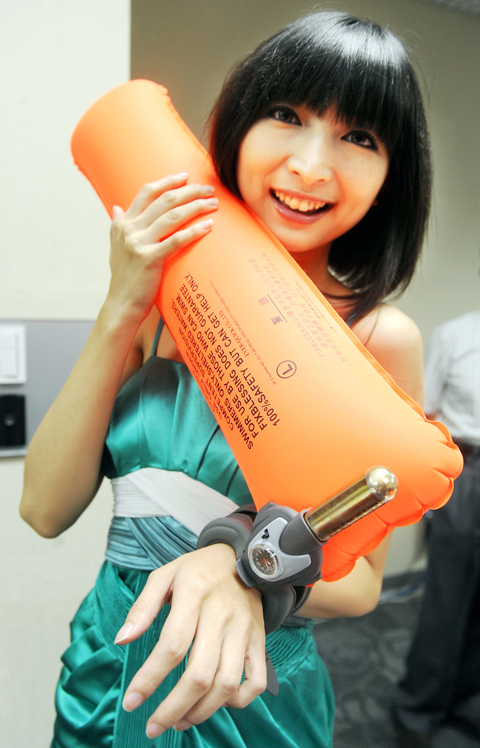A lifesaving watch, a singing faucet, a talking clothes hanger and an LED wedding dress are among the 2,000 new inventions and technologies to be showcased at this year’s Taipei Invention Show and Technomart, scheduled to begin on Thursday.
The watch, which functions as a flotation device that can support a person weighing up to 200kg in the water, contains an airbag that can be inflated within seconds. The wedding dress made of LED-embedded yarn aims to create a glowing visual effect to awe an audience.
The singing faucet, which plays music for 15 seconds before any water comes out, is supposed to encourage users to rub their hands thoroughly with liquid soap before washing, while the talking clothes hanger provides information about the material, style and price of a garment.

PHOTO: CHIEN JUNG-FONG, TAIPEI TIMES
“We hope the singing faucets can be used in hospitals, kindergartens, nursery schools and care homes for the elderly,” the makers said on Thursday at a pre-show press conference.
Now in its sixth year, the show at the Taipei World Trade Center Exhibition Hall 1 will feature the latest innovations and technologies from 20 countries and more than 660 companies, according to the organizers, Taiwan External Trade Development Council (外貿協會) and the Intellectual Property Office (IPO).
This year’s show promotes green products, inventions for use in everyday life and biotechnology items that improve people’s well-being, IPO deputy director Chu Hsing-hua (朱興華) said.
Meanwhile, the Institute for Information Industry (資策會) will showcase a 3G femtocell base station at the invention show.
The institute has said that it will seek international standardization certification for Taiwan’s first locally made compact base station, which is designed to increase residential wireless coverage, by the end of this year.
The institute said in a statement on Friday that it hopes local companies will be able to gain a share of a booming market for base stations after the Third Generation Partnership Project — the standardization organization in the field — certifies the technology at an upcoming event.
Major telecom operators in North America and the UK, such as AT&T Inc, Verizon Inc, Sprint Nextel Corp and Vodafone Group PLC have launched similar devices to provide better home coverage, the institute said.
Locally developed femtocells will likely cost only US$100 per unit, well below the current average of US$180 per unit for imported ones, the institute estimated.
The invention show will last until Oct. 3 and is estimated to draw 86,000 visitors this year, according to the trade development council.

IN THE AIR: While most companies said they were committed to North American operations, some added that production and costs would depend on the outcome of a US trade probe Leading local contract electronics makers Wistron Corp (緯創), Quanta Computer Inc (廣達), Inventec Corp (英業達) and Compal Electronics Inc (仁寶) are to maintain their North American expansion plans, despite Washington’s 20 percent tariff on Taiwanese goods. Wistron said it has long maintained a presence in the US, while distributing production across Taiwan, North America, Southeast Asia and Europe. The company is in talks with customers to align capacity with their site preferences, a company official told the Taipei Times by telephone on Friday. The company is still in talks with clients over who would bear the tariff costs, with the outcome pending further

A proposed 100 percent tariff on chip imports announced by US President Donald Trump could shift more of Taiwan’s semiconductor production overseas, a Taiwan Institute of Economic Research (TIER) researcher said yesterday. Trump’s tariff policy will accelerate the global semiconductor industry’s pace to establish roots in the US, leading to higher supply chain costs and ultimately raising prices of consumer electronics and creating uncertainty for future market demand, Arisa Liu (劉佩真) at the institute’s Taiwan Industry Economics Database said in a telephone interview. Trump’s move signals his intention to "restore the glory of the US semiconductor industry," Liu noted, saying that

STILL UNCLEAR: Several aspects of the policy still need to be clarified, such as whether the exemptions would expand to related products, PwC Taiwan warned The TAIEX surged yesterday, led by gains in Taiwan Semiconductor Manufacturing Co (TSMC, 台積電), after US President Donald Trump announced a sweeping 100 percent tariff on imported semiconductors — while exempting companies operating or building plants in the US, which includes TSMC. The benchmark index jumped 556.41 points, or 2.37 percent, to close at 24,003.77, breaching the 24,000-point level and hitting its highest close this year, Taiwan Stock Exchange (TWSE) data showed. TSMC rose NT$55, or 4.89 percent, to close at a record NT$1,180, as the company is already investing heavily in a multibillion-dollar plant in Arizona that led investors to assume

AI: Softbank’s stake increases in Nvidia and TSMC reflect Masayoshi Son’s effort to gain a foothold in key nodes of the AI value chain, from chip design to data infrastructure Softbank Group Corp is building up stakes in Nvidia Corp and Taiwan Semiconductor Manufacturing Co (TSMC, 台積電), the latest reflection of founder Masayoshi Son’s focus on the tools and hardware underpinning artificial intelligence (AI). The Japanese technology investor raised its stake in Nvidia to about US$3 billion by the end of March, up from US$1 billion in the prior quarter, regulatory filings showed. It bought about US$330 million worth of TSMC shares and US$170 million in Oracle Corp, they showed. Softbank’s signature Vision Fund has also monetized almost US$2 billion of public and private assets in the first half of this year,